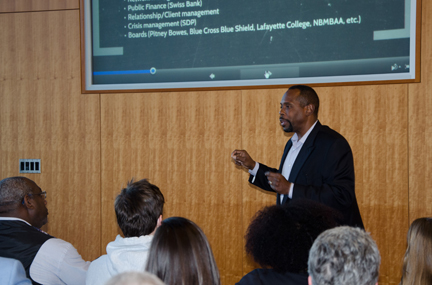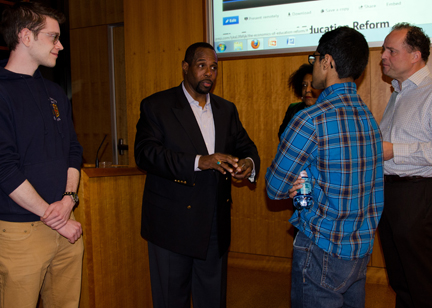By Andrew Fixler ’14

Lee Nunery ’77 discusses education and entrepreneurship April 9 in the Gendebien Room, Skillman Library.
My economics class was encouraged to attend a talk by Lee Nunery ’77, founder of PlusUltre, a Philadelphia education management firm, to complement our study of how entrepreneurs create value by challenging existing paradigms.
Nunery sees an imminent disruption in the education market. We often do not connect entrepreneurship and education; we might associate entrepreneurship with the Silicon Valley prodigies who proved that you do not need a college degree to change existing industries or to create entirely new ones. In addition, we might consider education to be resistant to entrepreneurial disruption, its mission too broad and intellectual to be considered in purely economic terms.
As Nunery pointed out, the education market is subject to a number of external factors that will force change. The system faces demographic shifts, globalization, the digital revolution, and a worsening income distribution. Nunery argues that these shocks present opportunities for entrepreneurs, both from within the field of education and without, to step up and pressure educational institutions to deliver more value.
The important question, then, is whether these imminent changes will manifest in an education system that delivers greater equitability, pedagogical efficacy, and cost-efficiency. Nunery’s analysis focuses on how the broadening and increasingly competitive market of educational services can either become incorporated into existing institutions or compete against them. The latter, he notes, could result in the collapse of small private schools that fail to buffer against intensifying market exposure.
It is incumbent on these institutions not to mimic other schools’ best practices, but to differentiate themselves and bolster their competitive advantage. He believes that blended education, which integrates various scalable, externally provided resources into the traditional brick-and-mortar school, will result in a future of personalized, efficient education. This is a good scenario for entrepreneurs and students alike.

Students talk with Lee Nunery ’77 after his presentation.
This possibility is exciting to me. This past semester, I have been working with a team of classmates on marketing research for Kinvolved, an education technology company founded by Alexandra Meis ’08 and Miriam Altman. Kinvolved makes applications that aim to improve K-12 student attendance by automatically notifying parents of absent or late students via text message, email, or automated call in a variety of languages. The software also offers data analysis tools to help educators identify at-risk students based on attendance records.
Technologies like this are capable of offering greater value than existing practices, or even unbinding the possibilities of how issues like truancy can be effectively addressed. Such technologies can also be pedagogical, like edX (a free resource for online courses from the world’s top scholars).
My teammates–Annie Zheng ’14, Neysa Braimah ’17, Eric Tilson ’15, Safo Appiah-Opong ’15, and Anh Nguyen ’15—and I created Quadrivium Group as an independent project. The name comes from the Latin term for the four upper liberal arts. The group is based on the idea that the Lafayette environment, with its strong engineering program and liberal arts core, is arguably among the most interdisciplinary and intellectually diverse in the country for its size, and is itself ripe for entrepreneurship.
I believe this to be Lafayette’s unique advantage. Excitingly, many developments around campus cultivate this environment, including the creation of IDEAL, which incubates interdisciplinary projects, and the re-visioning of the College’s intellectual property rules, which will allow students to retain ownership of ideas they develop while at Lafayette. Of course, the most important factor is the students themselves. I have been honored to work with my team, and I greatly enjoy listening to my classmates speak about their own ideas, passions, and projects.
Andrew Fixler ’14 (Weston, Mass.), an international affairs and economics double major, was a member of Economic Empowerment and Global Learning Project teams that assisted with a coffee plantation project and a storm water runoff problem in Honduras. He received the Rexroth Prize in German (language studies) as a sophomore and the Hunsicker Educational Prize for outstanding work in small-business studies this year.

